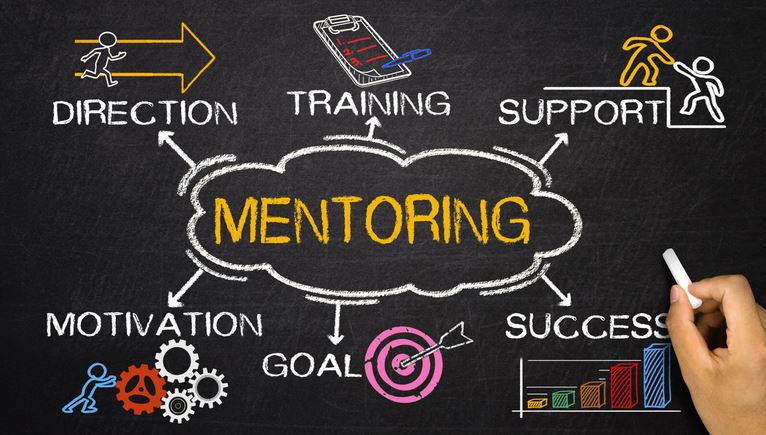 The Role Of Mentorship In Personal And Professional Development
The Role Of Mentorship In Personal And Professional Development
Whether you’re trying to develop on a personal level or a professional level, there is value in embracing the guidance of a mentor. If you think back to your past, you can probably point to several people with more experience who confidently walked through life and made you feel more confident when they patted you on the back, whether it was a teacher or a manager early in your career. Let’s discuss the role of mentorship in personal development.
Finding the right mentor will allow you to build a dynamic partnership, one that goes much further than simply teaching skills. It gives you access to wisdom, encourages mutual growth, and as a result, there is a shared experience between two people walking similar paths. Playing the mentor role is just as important to the personal and professional development journey. I have mentors for my online business, my health and wellness, and for my writing. I can’t imagine not having all three of these people in my life.
Unlocking Entrepreneurial Success: The Power of the Role of Mentorship
Mentorship stands as a cornerstone in the journey of entrepreneurial success. The guidance and support provided by a seasoned mentor can be transformative, aiding entrepreneurs in navigating challenges, gaining crucial insights, and ultimately realizing their goals. Yet, mentorship offers far more than just practical advice; it serves as a source of emotional support, encouragement, and motivation.
The Role of Mentorship in Entrepreneurship
Mentorship serves as a beacon of light in the often tumultuous world of entrepreneurship, offering a guiding hand through uncharted waters. Here’s why it’s indispensable:
Navigating Challenges: Entrepreneurs face a myriad of challenges, from navigating market fluctuations to making critical business decisions. A mentor’s wisdom, drawn from their own entrepreneurial journey, helps mentees navigate these challenges with confidence and resilience.
Gaining Valuable Insights: Mentors offer invaluable insights garnered from their own successes and failures. These insights provide entrepreneurs with a deeper understanding of industry dynamics, market trends, and effective strategies for growth.
Expanding Networks: Mentorship opens doors to new opportunities by expanding entrepreneurs’ networks. Mentors often facilitate introductions to key industry players, potential partners, and investors, thereby accelerating business growth and expansion.
Fostering Personal Growth: Beyond business acumen, mentorship fosters personal growth by instilling confidence, resilience, and a growth mindset in entrepreneurs. Mentors serve as trusted confidants, providing support and encouragement during both triumphs and setbacks.
Success Stories: Entrepreneurs Who Flourished with Mentorship:
Numerous successful entrepreneurs attribute a significant portion of their success to mentorship. Take, for instance:
Elon Musk (CEO of Tesla and SpaceX): Musk credits his success to the guidance of mentors such as Larry Page, co-founder of Google, and James Harris, a prominent Silicon Valley investor. Their mentorship provided Musk with invaluable insights and support as he navigated the complexities of building groundbreaking companies.
Sara Blakely (Founder of Spanx): Blakely attributes much of her entrepreneurial success to her mentor, Richard Branson, founder of the Virgin Group. Branson’s guidance and mentorship empowered Blakely to overcome obstacles, seize opportunities, and build Spanx into a global brand.
Finding and Cultivating Mentorship Relationships
Establishing a fruitful mentorship relationship requires deliberate effort and a strategic approach:
Identifying Potential Mentors: Seek out individuals who have achieved success in your industry or possess expertise relevant to your entrepreneurial journey.
Crafting a Compelling Request: Reach out to potential mentors with a clear, concise request for mentorship, highlighting why you admire their work and how their guidance could benefit your entrepreneurial endeavors.
Nurturing the Relationship: Once a mentorship relationship is established, nurture it through regular communication, mutual respect, and a willingness to learn and grow.
Overcoming Challenges in Mentorship
While mentorship offers immense benefits, it’s not without its challenges:
Communication Gap: Ensure open and consistent communication between mentor and mentee to avoid misunderstandings and misaligned expectations.
Relevance of Expertise: Seek mentors whose expertise aligns closely with your entrepreneurial goals and needs to maximize the value of the mentorship relationship.
Power Dynamics: Foster a collaborative and supportive environment where both mentor and mentee feel comfortable sharing insights, challenges, and feedback without fear of judgment or imbalance of power.
In the dynamic landscape of entrepreneurship, mentorship emerges as a guiding light, illuminating the path to success for aspiring entrepreneurs. By seeking out mentorship opportunities, entrepreneurs can tap into a wealth of wisdom, experience, and support that propels them towards their goals. Aspiring entrepreneurs, take heed: mentorship is not just a luxury but a necessity on the road to entrepreneurial greatness. Here, we’ll focus on the role it plays in the life of the mentee.
The Transfer of Skills and Knowledge
The first and most obvious point of mentorship is the exchange of skills and knowledge. A mentor is generally someone much further in their field than the mentee, which means they can provide insights the mentee hasn’t had a chance to gather through real-world experience.
Similarly, this exchange of knowledge puts skill development on an accelerant because not only can a mentor teach the mentee new skills, but the wisdom they impart helps the mentee put it all to work to tackle obstacles and challenges with an informed, strategic approach.
The Thread of Wisdom in the Role of Mentorship
If you are relying on a professional mentor, this person can serve as a compass. They can provide guidance as you navigate the industry, leverage their experience to offer helpful advice on your options, and highlight your skills and opportunities. This is ideal for anyone looking to advance their career, but it also helps foster a sense of purpose and direction, which is directly beneficial to your personal life.
Emotional Support and Growth
The role of mentorship goes far beyond the professional. A mentor can also help nurture emotional well-being and personal growth. Part of the role of the mentor is that the relationship creates a safe space for open and honest communication. This space allows you to discuss your fears, dreams, and challenges. That emotional support will help you in every aspect of life, not just your professional one.
Networking and Building Relationships
What many people forget to consider about a mentor is the networking opportunities and relationship building. Your mentor wants you to succeed because they are helping you develop to be your best. As an established person in the industry, they can introduce you to influential contacts, which is a great way to build your network and you never know when an opportunity will come your way thanks to one of those connections.
Inspiration
When someone chooses a mentor, it’s because it’s a person they respect. They see their success, they see certain qualities in them, and they want to achieve the same. So, the relationship between the two isn’t just about gaining wisdom or new skills, it’s also about building a work ethic and establishing the qualities you want to attain, and so a mentor is an inspirational role model. Or, an aspirational one, depending on how you look at it.
Importance of Mentors in Entrepreneurship
Mentors play a crucial role in entrepreneurship due to the following reasons:
Experience and Wisdom: Mentors often have years of experience in the industry or have faced similar challenges as the mentee. They offer invaluable wisdom gained through their own successes and failures, which can guide the mentee through uncertain territory.
Networking Opportunities: Mentors typically have extensive networks within the industry. They can introduce mentees to potential partners, investors, or customers, thus opening doors that might otherwise remain closed.
Emotional Support: Entrepreneurship can be a lonely journey filled with ups and downs. A mentor provides emotional support, encouragement, and reassurance during tough times, helping the mentee navigate through challenges with confidence.
Accountability and Motivation: Mentors hold mentees accountable for their goals and actions. They provide motivation and push mentees to strive for excellence, ensuring they stay focused and committed to their vision.
Holistic Growth: Beyond just business advice, mentors often provide guidance on personal development and work-life balance. They help mentees cultivate a balanced approach to entrepreneurship, fostering growth not only professionally but also personally.
Definition of a Mentor and Their Role
A mentor is an experienced and trusted advisor who offers guidance, support, and feedback to someone less experienced, known as the mentee, in order to help them achieve their goals and realize their potential. The role of a mentor involves:
Guidance and Direction: Mentors help mentees clarify their goals, define their vision, and chart a path towards success. They offer insights and advice based on their own experiences, guiding mentees through strategic decision-making processes.
Sharing Knowledge and Expertise: Mentors impart their knowledge, skills, and expertise to mentees, providing them with practical insights and solutions to overcome challenges they may encounter in their entrepreneurial journey.
Providing Feedback and Accountability: Mentors offer constructive feedback and hold mentees accountable for their actions, encouraging them to reflect on their progress, identify areas for improvement, and take necessary steps to grow and develop.
Networking and Introductions: Mentors leverage their networks to connect mentees with valuable contacts, resources, and opportunities, facilitating their professional growth and expansion within the industry.
Offering Emotional Support: Mentors provide a safe space for mentees to express their fears, doubts, and concerns. They offer empathy, encouragement, and motivation, helping mentees build resilience and navigate through challenges with confidence.
Benefits of Having a Mentor for Both Business and Personal Growth
Having a mentor yields numerous benefits for personal growth and development for entrepreneurs, including:
Accelerated Learning: Mentors provide access to knowledge, insights, and experiences that accelerate the learning curve for mentees, enabling them to make informed decisions and avoid common pitfalls.
Guidance and Direction: The Role of Mentorsship offer guidance and direction, helping mentees set clear goals, develop effective strategies, and overcome obstacles on their path to success.
Networking Opportunities: Mentors facilitate networking opportunities, connecting mentees with influential contacts, mentors, and collaborators who can contribute to their professional growth and expansion.
Emotional Support: Mentors offer emotional support, encouragement, and motivation, helping mentees navigate through challenges, setbacks, and uncertainties with resilience and confidence.
Personal Development: Mentors help mentees cultivate essential soft skills such as communication, leadership, and resilience, fostering their personal growth and development beyond just business success.
In summary, mentors play a pivotal role in entrepreneurship by offering guidance, support, and wisdom that accelerates the mentee’s growth and success, both professionally and personally. Their invaluable contributions help mentees navigate through challenges, seize opportunities, and achieve their full potential in the entrepreneurial journey.
Identifying Potential Mentors
Researching Industry Leaders and Successful Entrepreneurs:
Utilize online resources such as LinkedIn, industry forums, and business publications to identify individuals who have achieved success in your field.
Look for individuals whose values, experiences, and achievements resonate with your own entrepreneurial aspirations.
Seeking Recommendations from Professional Networks Around the Role of Mentorship:
Leverage your existing professional networks, such as alumni associations, industry events, and networking groups, to seek recommendations for potential mentors.
Reach out to colleagues, mentors, or advisors who may be able to introduce you to individuals with relevant expertise and experience.
Approaching Mentors
Crafting a Compelling Introduction and Request:
Write a concise and personalized introduction that highlights why you admire the mentor and how their expertise aligns with your goals.
Clearly articulate what you hope to gain from the mentorship and why you believe they would be a valuable mentor.
Express genuine enthusiasm and appreciation for the mentor’s time and expertise.
Demonstrating Eagerness to Learn and Grow:
Communicate your willingness to learn, grow, and take action on the mentor’s advice.
Share specific areas where you seek guidance and improvement, demonstrating self-awareness and a proactive mindset.
Highlight your commitment to personal and professional development, emphasizing your dedication to achieving success in your entrepreneurial endeavors.
Nurturing the Role of Mentorship As a Relationship
Regular Check-ins and Updates:
Schedule regular check-ins with your mentor to provide updates on your progress, discuss challenges, and seek guidance on important decisions.
Respect your mentor’s time by coming prepared with specific questions or topics for discussion. Be proactive in scheduling meetings and maintaining open lines of communication to ensure the relationship remains strong and productive.
Being Open to Feedback and Willing to Implement Suggestions
Approach feedback with an open mind and a willingness to learn from your mentor’s insights and perspectives.
Take constructive criticism in stride, viewing it as an opportunity for growth and improvement.
Actively seek out opportunities to implement your mentor’s suggestions and recommendations, demonstrating your commitment to personal and professional development.
By following these steps and approaches, you can effectively identify potential mentors, craft compelling requests, and nurture meaningful mentorship relationships that contribute to your entrepreneurial success and personal growth. Remember to approach mentorship with humility, gratitude, and a genuine desire to learn and grow from the wisdom and guidance of experienced mentors.
Real-Life Examples of Entrepreneurs Who Have Benefited from Mentorship
Highlighting Specific Mentors and Their Contributions:
There are many stories of successful entrepreneurs who attribute a significant portion of their success to mentorship. Understanding the role and impact of specific mentors in the mentee’s entrepreneurial journey, including their guidance, support, and influence.
The Impact of Mentorship on Business Growth and Personal Development
Mentorship has contributed to tangible outcomes such as increased revenue, market expansion, or product innovation.
The mentee’s personal growth and development as a result of their mentorship experience may include improvements in leadership skills, decision-making abilities, and confidence.
Testimonials from Both Mentors and Mentees
Insights into the role of Mentorship Experience from Both Perspectives:
Testimonials from both mentors and mentees provides a balanced perspective on the mentorship experience.
Ask mentors to share their observations of the mentee’s growth and progress, as well as the satisfaction they derive from contributing to their mentee’s success.
Encourage mentees to share their appreciation for their mentor’s guidance, support, and mentorship style, as well as the specific ways in which their mentor has impacted their entrepreneurial journey.
Illustrating the Mutual Benefits of Mentorship
Highlight the reciprocal nature of mentorship, emphasizing how both mentors and mentees derive value from the relationship.
Showcase examples of mentors who find fulfillment and satisfaction in sharing their knowledge and expertise with aspiring entrepreneurs.
Demonstrate how mentees contribute to their mentor’s personal and professional growth through their enthusiasm, fresh perspectives, and innovative ideas.
Crafting Compelling Case Studies About the Role of Mentorship
Choose Diverse Case Studies: Select case studies that represent a diverse range of industries, business models, and mentorship dynamics to appeal to a broad audience.
Provide Concrete Examples: Use specific anecdotes, metrics, and outcomes to illustrate the impact of mentorship on both business success and personal development.
Include Before-and-After Scenarios: Paint a vivid picture of the mentee’s journey by contrasting their initial challenges and aspirations with their achievements and growth after receiving mentorship.
Incorporate Quotes and Testimonials: Use direct quotes and testimonials from mentors, mentees, and other stakeholders to add authenticity and credibility to the case studies.
By incorporating real-life case studies and success stories into your article, you can effectively demonstrate the transformative power of mentorship in entrepreneurship, while providing actionable insights and inspiration for aspiring entrepreneurs seeking mentorship opportunities.
Here are a few examples of successful entrepreneurs who have openly credited mentorship as a key factor in their success:
Mark Zuckerberg (Co-founder and CEO of Facebook):
Zuckerberg has acknowledged the guidance and support he received from mentors like Steve Jobs, the late co-founder and former CEO of Apple. Jobs advised Zuckerberg on various aspects of building and scaling a successful tech company, including product design, user experience, and strategic partnerships.
Oprah Winfrey (Media Mogul and Philanthropist):
Winfrey has spoken about the significant influence of her mentor, the renowned author and poet Maya Angelou. Angelou served as a mentor and confidante to Winfrey, providing guidance, wisdom, and encouragement throughout her career. Winfrey credits Angelou with helping her navigate challenges, find her voice, and embrace her authenticity.
Warren Buffett (Chairman and CEO of Berkshire Hathaway):
Buffett attributes much of his success as an investor to his mentor, Benjamin Graham, a pioneering investor and author of “The Intelligent Investor.” Graham introduced Buffett to the principles of value investing and provided invaluable guidance on stock analysis, risk management, and portfolio strategy.
Sheryl Sandberg (COO of Facebook and Author):
Sandberg has credited her former boss and mentor, Larry Summers, the former Treasury Secretary and Harvard University president, with shaping her leadership style and career trajectory. Summers mentored Sandberg during her time at the U.S. Treasury Department and later encouraged her to join Facebook, where she played a pivotal role in the company’s growth and success.
Richard Branson (Founder of Virgin Group):
Branson has acknowledged the impact of numerous mentors throughout his entrepreneurial journey, including Sir Freddie Laker, the founder of Laker Airways, and Sir David Frost, the renowned broadcaster and journalist. Branson credits these mentors with providing valuable guidance, inspiration, and encouragement as he built and expanded the Virgin brand across diverse industries.
These examples highlight how mentorship can play a significant role in the success of entrepreneurs across different industries and stages of their careers. Mentors provide invaluable guidance, support, and wisdom that empower entrepreneurs to overcome challenges, seize opportunities, and achieve their full potential.
Final Thoughts
Ultimately, many people succeed without a mentor – but those people tend to deal with challenges and stresses they wouldn’t have had to navigate alone had they reached out to someone with more experience and wisdom.
If you aspire to greatness and you want to be the best version of yourself, then finding a mentor you look up to and respect is a great move for your professional and personal development. The role of mentorship cannot be overstated. We’re all students of the world, so why wouldn’t you accept help from someone further into their journey?
I’m Wall Street Journal and USA Today bestselling author, independent publisher, and serial entrepreneur Connie Ragen Green and would love to connect with you. If you’re new to the world of online entrepreneurship please check out my training on how to make your first income online at 3 Day eBiz (Use Code: MAKEITHAPPEN to Save) and learn how to gain an unfair advantage when it comes to building a lucrative online business.








Great tips. I’ve always found having a good mentor to have a huge impact on personal development and business development.